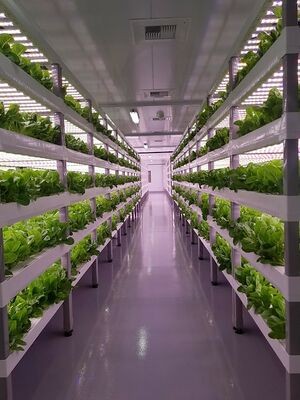Vertical farming

Vertical farming is the idea that food could be grown in tall towers with multiple floors, which is supposed to save space and use less land (thus saving more of the environment), but on close examination we see that it doesn't.
Not a solution to feed the world
Powering the grow lights
Natural sunlight is proportional to land
Thought experiment
If all crops were grown in vertical farms, how much energy would be needed to power all the grow lights?
(calculation loading)
In other words, we would need _ times more energy than the world currently consumes!
Since most energy currently comes from fossil fuels, this would be disastrous for the environment.
But what if the energy came from renewables?
We already have a hard enough time scaling up renewables - but let's imagine it was easy. Still, vertical farms would defeat their entire purpose: They wouldn't save land.
(calculation loading)
In other words, to grow an acre worth of plants
To convert...
- sunlight → electricity → back to light again
can never be as efficient as...
- just using the sunlight directly.
The land requirements for wind power would be even higher. Keep in mind that wind power is still indirectly a kind of solar power: winds are caused by the sun heating the air.
Uranium is far too scarce to power the grow lights with nuclear fission. Maybe fusion power could do it someday. Until then, vertical farming is just a bad idea.
But doesn't it take energy to ship food from farm to city?
Yes. Just nowhere near as much as what vertical farming would take.
But what about shade crops?
Shade crops could already be grown in the shade of full-sun crops. Most of the crops that feed the world require full sunlight. This is because calories & protein require energy in the form of light shining on the plants.
There might be a very small niche for growing low-calorie greens in vertical farms in the city, just so people can enjoy herbs at their absolute freshest.
Cases where vertical farming might actually be a good idea
Growing mushrooms
Mushrooms don't get their energy from the sun - they get their energy from fiber. Since food crops have inedible fibrous parts, there is plenty of material to cultivate mushrooms on. Mushrooms could be grown in tall buildings or deep basements with no light at all.
Disambiguation
Some people use the term "vertical farming" to refer to something different: a rich layered polyculture - no multi-storey buildings involved. This type of "vertical farming" actually has good potential to feed the world.
See also
- Food - a general overview, including better solutions to feeding the world.